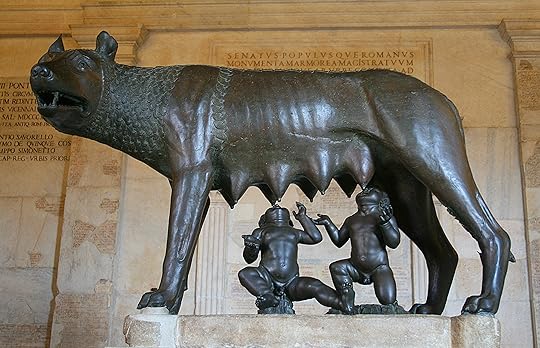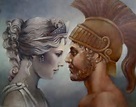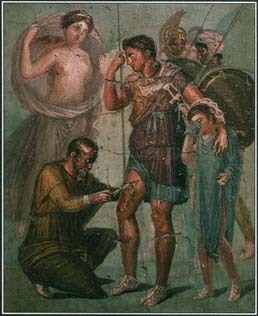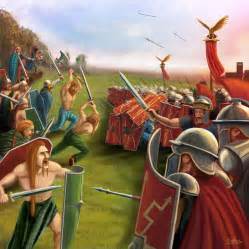The History Book Club discussion
ROMAN EMPIRE -THE HISTORY...
>
WE ARE OPEN - WEEK TWO - SPQR - A HISTORY OF ANCIENT ROME - WEEK TWO - April 24th - April 30th - Chapter Two: In the Beginning - (pages 53-90) ~ No Spoilers, Please
date newest »
newest »
 newest »
newest »
message 2:
by
Vicki, Assisting Moderator - Ancient Roman History
(last edited Apr 19, 2017 12:52PM)
(new)
Everyone, for the week of April 24th - April 30th , we are reading Chapter 2.
The second week's reading assignment is:
WEEK TWO - April 24th - April 30th -> 2: In the Beginning (53-90)
Chapter Overview and Summary:
2: In the Beginning

Romulus and Remus being suckled by the she-wolf
Rome has two origin stories. In the first one, we have the twins Romulus and Remus, born to the daughter of the deposed king of Alba Longa, who was supposed to remain a virgin but was raped by the god Mars. The babies were exposed but were rescued by a lactating she-wolf, who suckled them until they were taken in and raised by a local shepherd. When the twins grew up, they decided to set up a city on one of the hills on the banks of the river Tiber, each one on a different hill. Omens seemed to favor the one Romulus chose, and he marked the boundaries of his city by plowing a furrow around the edges. Remus mocked the efficacy of this “wall” by jumping over it, and Romulus killed him.
Since the citizens of this town were mostly landless young men, in some cases even bandits, they needed women for wives. They invited the neighboring Sabines to a festival and in the middle of it, grabbed the women and chased away the men. When the Sabine men later came back to do battle with the Romans, the women pleaded with their fathers and brothers not to hurt their new husbands but to let the status quo remain and live in peace. This supposedly occurred in the middle of the 700s BCE.
The other story starts in the 1200s BCE with the fall of Troy. Aeneas, one of the Trojan warriors and the son of the goddess Venus, flees the burning city with his son Iulus/Ascanius and his father. They wind up in Carthage whose queen Dido falls in love with Aeneas and begs him to stay with her. But he knows his destiny is to found a great city in Italy, so he sails away. Dido throws herself on her funeral pyre. Aeneas and his followers land in Italy near the mouth of the Tiber, eventually fight with some locals, and Aeneas founds the city of Lavinium.
The second week's reading assignment is:
WEEK TWO - April 24th - April 30th -> 2: In the Beginning (53-90)
Chapter Overview and Summary:
2: In the Beginning

Romulus and Remus being suckled by the she-wolf
Rome has two origin stories. In the first one, we have the twins Romulus and Remus, born to the daughter of the deposed king of Alba Longa, who was supposed to remain a virgin but was raped by the god Mars. The babies were exposed but were rescued by a lactating she-wolf, who suckled them until they were taken in and raised by a local shepherd. When the twins grew up, they decided to set up a city on one of the hills on the banks of the river Tiber, each one on a different hill. Omens seemed to favor the one Romulus chose, and he marked the boundaries of his city by plowing a furrow around the edges. Remus mocked the efficacy of this “wall” by jumping over it, and Romulus killed him.
Since the citizens of this town were mostly landless young men, in some cases even bandits, they needed women for wives. They invited the neighboring Sabines to a festival and in the middle of it, grabbed the women and chased away the men. When the Sabine men later came back to do battle with the Romans, the women pleaded with their fathers and brothers not to hurt their new husbands but to let the status quo remain and live in peace. This supposedly occurred in the middle of the 700s BCE.
The other story starts in the 1200s BCE with the fall of Troy. Aeneas, one of the Trojan warriors and the son of the goddess Venus, flees the burning city with his son Iulus/Ascanius and his father. They wind up in Carthage whose queen Dido falls in love with Aeneas and begs him to stay with her. But he knows his destiny is to found a great city in Italy, so he sails away. Dido throws herself on her funeral pyre. Aeneas and his followers land in Italy near the mouth of the Tiber, eventually fight with some locals, and Aeneas founds the city of Lavinium.

Venus and Mars
Discussion Topics:
1. What do you think of the fact that both foundation stories give the founders divine origins – Mars in the case of Romulus and Remus and Venus for Aeneas?
2. When and why did the Romans appropriate the Greek gods, giving them new names?

Aeneas with his father Anchises, mother Venus and son Iulus
Discussion Topics:
1. Is it unusual that both origin stories have the founders coming to Rome from someplace else?
2. Did they need the Aeneas story to make their origin classier than just being founded by a roving bunch of bandits and runaways?

Romans battling Gauls
Discussion Topics:
1. Do you think the Romans liked the idea of Rome being founded by a son of Mars as a way to explain their later warlike behavior?
2. Did the idea that Romulus killed his brother make it easier to engage in civil war?
 Vicki wrote: "Aeneas with his father Anchises, mother Venus and son Iulus
Vicki wrote: "Aeneas with his father Anchises, mother Venus and son Iulus Discussion Topics:
1. Is it unusual that both origin stories have the founders coming to Rome from someplace else?
2. Did they need t..."
To answer #2, I think the Romans needed to feel special about themselves. They knew the story of the Greek Empire, and what better place to emulate! How else to explain why the gods blessed them with all their successes.
 2. When and why did the Romans appropriate the Greek gods, giving them new names?
2. When and why did the Romans appropriate the Greek gods, giving them new names? During my trip to Rome we went on a guided tour where the tour guide explained that the early church adopted the dates of Roman Festivals to Christian Holidays. For example, Christmas is celebrated on the same day as one of the primary festivals for Apollo. This was done to try to get Romans to convert to the new religion and bridge the gap between what was familiar and new. Although this the question above is not documented, I imagine Rome incorporated the Greek gods at an earlier time under a similar process.
message 8:
by
Vicki, Assisting Moderator - Ancient Roman History
(last edited Apr 25, 2017 03:49PM)
(new)
Thinking about the Romans appropriating and renaming Greek gods makes me want to read Mary Beard's books about Roman religion. It's sort of something we take for granted.

 by
by
 Mary Beard
Mary Beard

 by
by
 Mary Beard
Mary Beard
 When and why did the Romans appropriate the Greek gods, giving them new names?
When and why did the Romans appropriate the Greek gods, giving them new names?'Appropriate' does not sound quite right when we talk about the age where Rome was still a small town while Greek culture had spread over a vast area. Could it be the other way around? Perhaps the Romans recast their own deities in the Greek mould? Which means their gods had always been there, just that their presentation had changed.
What do you think of the fact that both foundation stories give the founders divine origins – Mars in the case of Romulus and Remus and Venus for Aeneas?
That was quite usual in the ancient world. Sparta was founded by a son of Zeus. The goddess Athens played a role in founding Athens. Egyptian pharaos were descended from the gods. Cyrus the Great was another orphan Romulus, saved by a shepherd and later founding a dynasty. What better way to justify your own power than to claim direct descent from Romulus and the gods?
Did the idea that Romulus killed his brother make it easier to engage in civil war?
It might be used to justify civil war with nice rhetoric but no doubt, other more pragmatic concerns played a bigger role in launching such a dangerous adventure. Do we have any evidence that civil wars were more frequent in Rome than in other ancient empires? If anything, it seems like the opposite is true.
 I think that having mythological founders like Romulus or Aeneas is much more glamorous, exciting and something to be proud of than; a few late Neolithic-Early Bronze age villages in the same area, becoming large enough to merge and the people in that merged village calling it Rome. Which is the direction the archaeological evidence seems to be pointing.
I think that having mythological founders like Romulus or Aeneas is much more glamorous, exciting and something to be proud of than; a few late Neolithic-Early Bronze age villages in the same area, becoming large enough to merge and the people in that merged village calling it Rome. Which is the direction the archaeological evidence seems to be pointing.
So true, Michele. Much more glamorous to have your city founded by a hero of Troy than just a collection of farmers/tradesmen/merchants who happened to collect at a fortunate place on a river.
Thanks for your comments, Boris. I guess having an actual god involved in your city's beginnings makes you really special. As far as the fratricide and civil wars, I think Beard mentions it, but I think the civil wars came rather late in Rome's history, so maybe that's a bit of a stretch.
It's interesting that Romulus' and Remus' mother was a sort of Vestal Virgin, since this religious function was supposedly instituted by the second king, Numa Pompilius. Perhaps he stole the idea from Alba Longa.
 Genesis myths are often at the very core of one's identity, and in peoples biographies as well as in the stories of cities, countries and organizations, they often acquire some sort of quasi-mythical status. That Rome has at least three foundation myths are therefore no surprise.
Genesis myths are often at the very core of one's identity, and in peoples biographies as well as in the stories of cities, countries and organizations, they often acquire some sort of quasi-mythical status. That Rome has at least three foundation myths are therefore no surprise. What I found really interesting in this chapter is the difference in how these foundation myths legitimize giving other peoples citizenship of Rome (cf. "the idea of the asylum" p. 66f and "however far back you, the inhabitants of Rome were always from somewhere else" p. 78), something that is in great contrast to the Greek city states Athens and Sparta where citizenship was almost impossible to get for outsiders.
I like how Bears writes equally compelling about the myths, the historical sources and the archeological material. One clearly needs all of these perspectives when trying to circle in this story.
Yes, Ola, the idea that "we all came from somewhere else" seems to be basic to Roman identity. Even slaves could be freed and participate in voting, and their children would legally be citizens - probably more common in Rome than in Greece.
 Thanks for your post, Ola, especially this part:
Thanks for your post, Ola, especially this part:"legitimize giving other peoples citizenship of Rome (cf. "the idea of the asylum" p. 66f and "however far back you, the inhabitants of Rome were always from somewhere else" p. 78)
... a very important concept in today's world.
From what I understand, offering citizenship to the leaders of the peoples they invaded helped persuade them to go along with the idea of being conquered.
I wonder when the stop at Carthage on Aeneas' voyage to found a great city in Italy was added to the myth. For that matter, when did the prophesy that he would found such a city become part of the story? Too bad we don't have very early documents recounting these legends.
The week 3 thread is now open. We'll be discussing the supposed kings of Rome.
Here's the link to week 3.
https://www.goodreads.com/topic/show/...
Here's the link to week 3.
https://www.goodreads.com/topic/show/...
 It's interesting that there's so little reliable archeological evidence available about early Roman life.
It's interesting that there's so little reliable archeological evidence available about early Roman life.
 Every time they expand the subway system in Rome these days they find more stuff. I guess it depends on how deep they dig. It's always fascinating to see what they come up with!
Every time they expand the subway system in Rome these days they find more stuff. I guess it depends on how deep they dig. It's always fascinating to see what they come up with!
 Vicki wrote: "Venus and Mars
Vicki wrote: "Venus and MarsDiscussion Topics:
1. What do you think of the fact that both foundation stories give the founders divine origins – Mars in the case of Romulus and Remus and Venus for Aeneas?
2. ..."
Hi everybody. Sorry for the late reply. These are my answers to the first set of questions.
1. I think that Rome associating its foundations with the gods is their way of, perhaps, overcoming the humble origins of their city. I could imagine that a city atop of an empire like Rome would be somewhat embarrassed to admit that they didn't have great origins or that their empire wasn't foreordained. It could also give justification to having an empire at all as Prof. Beard suggests at one point in this chapter I believe.
2. I'm not sure when the Romans appropriated the Greek gods (though I suspect it will be mentioned in an upcoming chapter). I suspect that they felt a kind of jealousy when they saw their cultural empire, they felt it necessary to take it for their own.
Hi yourself, Christopher - it's never too late to add comments on the reading.
I suspect you're right about #1, It's so much better to have been founded by the son of a god, and the god of war at that, and the daughter of a king than to have just grown from a collection of peasants and outlaws.
I suspect you're right about #1, It's so much better to have been founded by the son of a god, and the god of war at that, and the daughter of a king than to have just grown from a collection of peasants and outlaws.
 All civilizations have their own foundation myths and origin stories - this is to create a sense of identity, cultural pride and stress the uniqueness of that particular civilization. Claiming divine origin was not rare in the ancient world. Specially the Romans , who would have had a huge sense of their own self importance , would have felt the need for a sufficiently grand and impressive origin story.
All civilizations have their own foundation myths and origin stories - this is to create a sense of identity, cultural pride and stress the uniqueness of that particular civilization. Claiming divine origin was not rare in the ancient world. Specially the Romans , who would have had a huge sense of their own self importance , would have felt the need for a sufficiently grand and impressive origin story.As for appropriating the Greek gods, ancient religions were syncretic in nature, and usually assimilated/adopted the pantheons of the areas they conquered/spread their influence in.
The author gives very little idea about what Roman gods were like to begin with but I don't think it was a completely identical equation (I cannot think of a Greek equivalent for the Roman God Janus for example). The Greeks probably being the most advanced civilisation in those days influenced the Romans. Their choice of foundation myths also shows the perceived identity that the contemporary Romans chose for themselves.
I think their choice of Aeneas, a Trojan, as a founding father is interesting- obviously the Romans were heavily influenced by the Greeks but wanted to claim a separate identity for themselves and I think this is reflected in their choosing a hero who was an adversary of the Greeks/victim of the Trojan wars.
Is there any writing on what the Romans thought about the Greeks?
Thanks for the comments, Aparajita. Googling "romans and greeks" took me to this interesting page -
Comparisons Between the Ancient Greeks and Romans
As far as what Romans thought of the Greeks, all educated Romans spoke and read Greek, so they must have found Greek culture useful. However, one prominent Roman, Cato the Elder, was famously disdainful of the Greeks.
 by Cato The Elder (no photo)
by Cato The Elder (no photo)
Comparisons Between the Ancient Greeks and Romans
As far as what Romans thought of the Greeks, all educated Romans spoke and read Greek, so they must have found Greek culture useful. However, one prominent Roman, Cato the Elder, was famously disdainful of the Greeks.
 by Cato The Elder (no photo)
by Cato The Elder (no photo)
Books mentioned in this topic
Complete Works of Cato the Elder (other topics)Religions of Rome, Volume 1: A History (other topics)
Religions of Rome, Volume 2: A Sourcebook (other topics)
SPQR: A History of Ancient Rome (other topics)
Authors mentioned in this topic
Marcus Porcius Cato (other topics)Mary Beard (other topics)
Mary Beard (other topics)




For the week of April 24th - April 30th, we are reading chapter 2 of SPQR: A History of Ancient Rome by Mary Beard.
The second week's reading assignment is:
WEEK TWO - April 24th - April 30th -> 2. In the Beginning (53-90)
We will open up a thread for each week's reading. Please make sure to post in the particular thread dedicated to those specific chapters and page numbers to avoid spoilers. We will also open up supplemental threads as we did for other spotlighted books.
This book was kicked off April 17th.
We look forward to your participation. Amazon, Barnes and Noble, Borders and other noted on line booksellers do have copies of the book and shipment can be expedited. The book can also be obtained easily at your local library, or on your Kindle.
There is no rush and we are thrilled to have you join us. It is never too late to get started and/or to post.
Vicki Cline will be moderating this selection.
Welcome,
~Vicki
TO ALWAYS SEE ALL WEEKS' THREADS SELECT VIEW ALL
REMEMBER NO SPOILERS ON THE WEEKLY NON SPOILER THREADS - ON EACH WEEKLY NON SPOILER THREAD - WE ONLY DISCUSS THE PAGES ASSIGNED OR THE PAGES WHICH WERE COVERED IN PREVIOUS WEEKS. IF YOU GO AHEAD OR WANT TO ENGAGE IN MORE EXPANSIVE DISCUSSION - POST THOSE COMMENTS IN ONE OF THE SPOILER THREADS. THESE CHAPTERS HAVE A LOT OF INFORMATION SO WHEN IN DOUBT CHECK WITH THE CHAPTER OVERVIEW AND SUMMARY TO RECALL WHETHER YOUR COMMENTS ARE ASSIGNMENT SPECIFIC. EXAMPLES OF SPOILER THREADS ARE THE GLOSSARY, THE BIBLIOGRAPHY, THE INTRODUCTION AND THE BOOK AS A WHOLE THREADS.
Notes:
It is always a tremendous help when you quote specifically from the book itself and reference the chapter and page numbers when responding. The text itself helps folks know what you are referencing and makes things clear.
Citations:
If an author or book is mentioned other than the book and author being discussed, citations must be included according to our guidelines. Also, when citing other sources, please provide credit where credit is due and/or the link. There is no need to re-cite the author and the book we are discussing however.
Here is the link to the thread titled Mechanics of the Board which will help you with the citations and how to do them.
https://www.goodreads.com/topic/show/...
Also, the citation thread:
https://www.goodreads.com/topic/show/...
Introduction Thread:
https://www.goodreads.com/topic/show/...
Table of Contents and Syllabus
https://www.goodreads.com/topic/show/...
Glossary
Remember there is a glossary thread where ancillary information is placed by the moderator. This is also a thread where additional information can be placed by the group members regarding the subject matter being discussed.
Here is the link:
https://www.goodreads.com/topic/show/...
Bibliography
There is a Bibliography where books cited in the text are posted with proper citations and reviews. We also post the books that the author may have used in his research or in her notes. Please also feel free to add to the Bibliography thread any related books, etc. with proper citations or other books either non-fiction or historical fiction that relate to the subject matter of the book itself. No self-promotion, please.
Here is the link:
https://www.goodreads.com/topic/show/...
Book as a Whole and Final Thoughts - Spoiler Thread
https://www.goodreads.com/topic/show/...
Link: